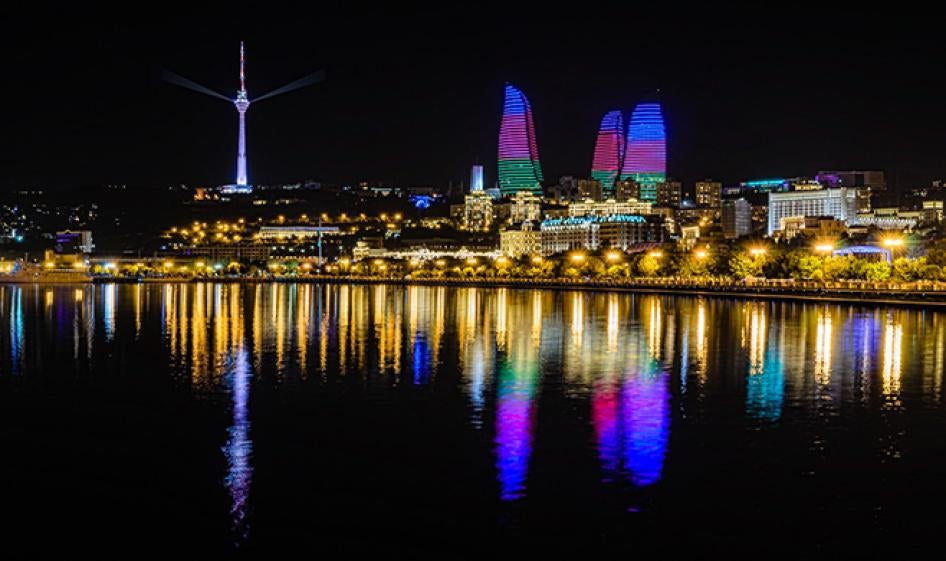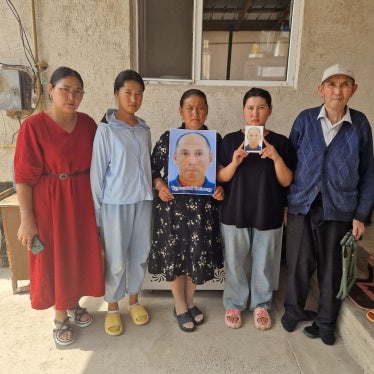Over the last two years, Azerbaijan has rapidly become one of the most oppressive countries in the post-Soviet space. Still, in a somewhat surprising alliance between CDU and Die Linke the MPs Mark Hauptmann (CDU), Eberhard Gienger (CDU), and André Hahn (Die Linke) called for Germany’s support for the Azerbaijani government (FR October 19). They justified attending the European Games held in the capital Baku in June and complained about the many critics who used the opportunity to remind the world of the numerous human rights violations for which the Azerbaijan government is responsible. They also carped at the missing European heads of states for passing on the “opportunity” to show solidarity with President Ilham Aliyev on the VIP stand.
Let’s quickly review who else was not attending those games? Respected investigative journalist Khadija Ismayilova, ailing human rights leaders Leyla and Arif Yunus, human rights activist Rasul Jafarov, human rights lawyer Intigam Aliyev and others—all jailed and silenced before the Baku Games. This meant that German MPs attending the Games would only see the “wonderful” side of the country and be blinded by glitz and glamor, while those who criticize the authorities for human rights abuses languish in Azerbaijani cells. For sure the authors of the op-ed drove on the spotless highway taking them from the new Baku airport to the Dubai-style city center. But they should have also noticed the walls on both sides of that highway, which Khadija Ismayilova used to call the “belt of happiness,” as beyond those walls lies poverty and misery, which the government is so keen to hide.
For exposing that misery and the numerous rights violations Khadija Ismayilova and others like her are paying the price with their own liberty. She will receive Human Rights Watch’s highest honor for courage defending basic human rights, the Alison Des Forges Award for Extraordinary Activism, on November 11 in Munich. We sincerely hope the three authors will congratulate her.
All countries have problems. But once Azerbaijan signed itself up to host the European Games it put itself in the limelight. Scrutiny of its human rights record is part of that limelight. It was the right thing to do for VIPs not to show up in Baku. With a troubling rights record over many years, the Azerbaijani government upped its oppression ahead of the games.
Rather than being a catalyst for positive change, as many in the international sporting community had wistfully hoped against all evidence, the first European Games became yet another tool in the Azerbaijani government’s effort to promote itself as a progressive, modern country—all the while carrying out a domestic assault on those who challenge the government’s version of truth.
The European Games are owned and regulated by the European Olympic Committees (EOC), an association of 50 European National Olympic Committees. The EOC and its members are part of the Olympic Movement and they are governed by the Olympic Charter, which has explicit guarantees of media freedom, and calls for sport to promote ‘human dignity’ and ‘the harmonious development of humankind.’ But you would hardly believe that those are the guiding principles of these games, given Baku’s abuses in the run-up, while it has paid little, if any, price for those actions.
While Gienger, Hauptmann, and Hahn enjoyed themselves at the Baku Games, the Azerbaijani government selectively denied entry to or kicked out several journalists—the clearest possible violation of the Olympic Charter. International monitors and organisations were also barred. After years of research in country, Azerbaijan barred Human Rights Watch from entering the country. It stopped Amnesty International from releasing a report in Baku. And on the eve of the games, the government announced it was closing the Baku office of the inter-governmental Organisation for Security and Cooperation in Europe (OSCE), in which Azerbaijan is a participating state.
The EOC has largely turned a blind eye to the repression, and in doing so has failed to uphold the Olympic Charter. It has squandered a rare opportunity to press for meaningful, lasting change and the positive legacy sporting events should bring. Instead, Azerbaijan is more entrenched in repressive ways than ever. The fact that the International Olympic Committee (IOC) and EOC didn't act is a sign that awarding big sports events to repressive regimes brings sport down to whatever the dictator wants.
In its Agenda 2020, the Olympic Movement claims it would promote Olympic values of non-discrimination, friendship, solidarity and fair play. But so far these promises look hollow.
“We are sick to death of being lectured by the countries of Western Europe on the values of Olympism and what to do.” With this statement EOC chief Patrick Hickey said it all. The representatives of the Olympic Movement ignore their own values at great peril.
Because of Azerbaijan’ unfolding rights debacle, Western European leaders uniformly declined to attend the European Games opening ceremonies—no doubt much to the disappointment of both the EOC and President Aliyev, given the potential the ceremonies have to help legitimize and normalise the image of an abusive government. The most prominent world leader to attend was President Vladimir Putin of Russia.
While the article by Gienger, Hauptmann, and Hahn praises Azerbaijan’s purported geopolitical, strategic, and economic advantages and its pro-European path, the reality is they became tools of Aliyev’s propaganda, and are helping to hide an escalating human rights crisis. In the future, European leaders should study the facts in Azerbaijan instead of being fooled into reciting talking points written by the government’s well-paid lobbyists.








